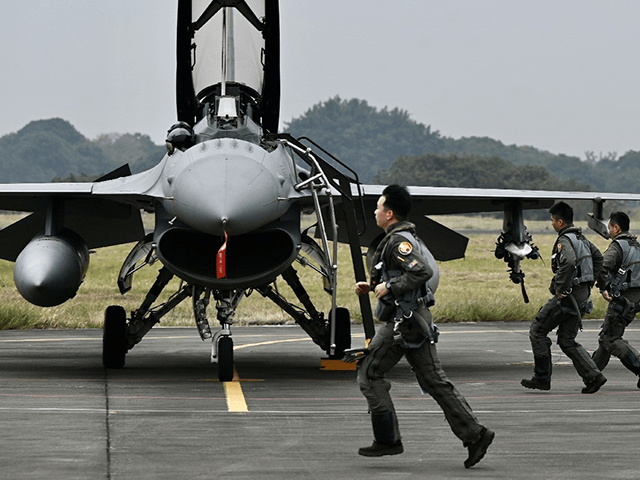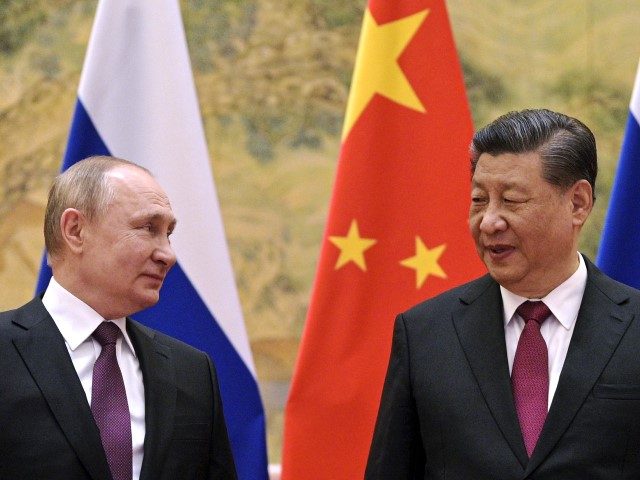Chinese dictator Xi Jinping called his Russian counterpart Vladimir Putin on Wednesday to offer financial support and backing on Russia’s “respective core interests,” Chinese state media revealed, just days after Ukrainian President Volodymyr Zelensky warned the world to defend Taiwan now before China decides to invade it.
Russia invaded Ukraine in 2014, colonizing its Crimean Peninsula that year and fueling an eight-year-old war between Kyiv and Russian-backed “states” in the eastern Donbas region. In February, Putin expanded the war by bombarding Kyiv, its suburbs, the southern port city of Mariupol, and other key areas, launching a full-scale assault. As a result, much of the Western world has called for a boycott of Russian products and divestment from the country.
China has abstained from any major role in the latest chapter of the Ukraine war, instead vaguely calling for a diplomatic resolution and rejecting any comparisons between Russia’s colonization of Ukraine and a potential Chinese invasion of Taiwan.
Taiwan is a sovereign, democratic island state off the coast of China. The Chinese Communist Party insists that Taiwan is a province of China seized by rogue separatists – despite the Taiwanese government having no historical ties to Beijing – and forces its allies to vow never to formally accept Taiwan’s sovereignty, a policy the Party calls the “one China principle.”
China’s Xinhua news agency, a government outlet, reported on Wednesday that Xi told Putin that he was pleased with the “steady progress” of China-Russia economic ties.
“The Chinese side stands ready to work with the Russian side to push for steady and long-term development of practical bilateral cooperation, Xi said,” according to Xinhua. “China is willing to work with Russia to continue supporting each other on their respective core interests concerning sovereignty and security, as well as on their major concerns.”
Xinhua did not elaborate on any conversation involving Ukraine, but stated that Xi was eager to work with Putin on the “development of the international order and global governance towards a more just and reasonable direction.”
Russian state news outlets largely coincided with the Chinese version of events in the Putin-Xi phone call. While Kremlin spokesman Dmitry Peskov reportedly told journalists Moscow would have more details later, confirming only that the call took place, state propaganda outlet Sputnik reported Xi’s alleged comments on the Ukraine invasion specifically.

A column of Pro-Russian rebel tanks prepare to move from the front line near Oleksandrivka, Luhansk region, eastern Ukraine. (Uncredited/AP Photo).
“The two presidents also addressed the issue of the ongoing conflict in Ukraine, with Xi Jinping telling Putin that all parties concerned should work towards ending it,” Sputnik claimed. “The Chinese leader, in turn, promised that Beijing will continue to play its constructive role in this process.”
Xi called Putin less than a week after the Washington Post published comments by Zelensky not to leave Taiwan “at the mercy of another country” – the way, he implied, the world abandoned Ukraine.
“No one benefits from [war], apart from certain political leaders who are not content with the present level of their ambitions. Therefore, they keep growing their appetites, their ambitions,” Zelensky reportedly replied to a direct question about Taiwan. “The world enables these leaders to grow their appetites for now, therefore we need a diplomatic resolution to support countries that are in need of help.”
Referring generally to smaller states, Zelensky said, “we must not leave them behind at the mercy of another country which is more powerful… if there is a way out diplomatically, we need to use the diplomatic way. But it must be a preemptive way, not the one that comes after the war has started.”
The Chinese government, through its Global Times propaganda newspaper, condemned the Washington Post for publishing the remarks, calling the newspaper “pathetic” and its report “false.” The Times emphasized that Zelensky never used Xi Jinping’s name or said “China,” even though the question he was responding to was exclusively about Taiwan’s relationship with China.
“Zelensky understands the issue concerns China’s core interest,” the Global Times claimed, while chiding the Ukrainian president for a “lack of full knowledge of the Taiwan question.”

Taiwan scrambled its own fighter jets on Sunday as China launched its biggest incursion into the self-ruled island’s air defence zone since October.
Zelensky has attempted to maintain friendly relations with communist China as Ukraine signed onto the Belt and Road Initiative (BRI), China’s global infrastructure debt trap plan, before he became president. Last month, Zelensky defended China for not taking any strong stances on Russia’s invasion, even as China strengthened its economic ties to Russia.
“China has chosen the policy of staying away. At the moment, Ukraine is satisfied with this policy. It is better than helping the Russian Federation in any case,” Zelensky told the World Economic Forum in Davos, Switzerland. “We are satisfied with this status quo, to be honest.”
Prior to the war, however, Zelensky antagonized China by blocking Chinese companies from attempting to buy Motor Sich, an aeronautics company that makes, among other key military items, jet engines. Zelensky imposed unilateral sanctions on China last year and nationalized Motor Sich to block the Communist Party from seizing the corporation.
While abstaining from a major role in the Ukraine invasion, Chinese officials have pressured the world not to compare a potential Chinese invasion of Taiwan to Russia’s invasion of Ukraine – emphasizing, to Zelensky’s approval, that Ukraine is a sovereign country in China’s eyes, while Taiwan is a rogue province hijacked by “separatists.”
“Taiwan is for sure not Ukraine,” Chinese Foreign Ministry spokeswoman Hua Chunying said in February in the immediate wake of Russia’s assault on Kyiv. “Taiwan has always been an inalienable part of China’s territory. This is an indisputable historical and legal fact.”
Hua did not offer any evidence for the claim, as Taiwan has never been governed by a regime headquartered in Beijing and the latter has no power over the current Taiwanese government.

COMMENTS
Please let us know if you're having issues with commenting.